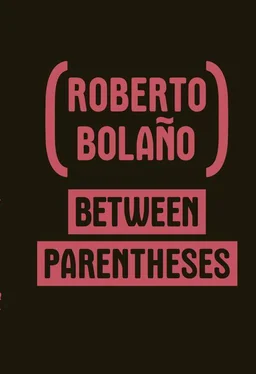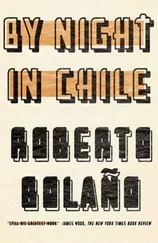Roberto Bolaño - Between Parentheses - Essays, Articles and Speeches, 1998-2003
Здесь есть возможность читать онлайн «Roberto Bolaño - Between Parentheses - Essays, Articles and Speeches, 1998-2003» весь текст электронной книги совершенно бесплатно (целиком полную версию без сокращений). В некоторых случаях можно слушать аудио, скачать через торрент в формате fb2 и присутствует краткое содержание. Год выпуска: 2011, Издательство: New Directions, Жанр: Публицистика, Критика, на английском языке. Описание произведения, (предисловие) а так же отзывы посетителей доступны на портале библиотеки ЛибКат.
- Название:Between Parentheses: Essays, Articles and Speeches, 1998-2003
- Автор:
- Издательство:New Directions
- Жанр:
- Год:2011
- ISBN:нет данных
- Рейтинг книги:4 / 5. Голосов: 1
-
Избранное:Добавить в избранное
- Отзывы:
-
Ваша оценка:
- 80
- 1
- 2
- 3
- 4
- 5
Between Parentheses: Essays, Articles and Speeches, 1998-2003: краткое содержание, описание и аннотация
Предлагаем к чтению аннотацию, описание, краткое содержание или предисловие (зависит от того, что написал сам автор книги «Between Parentheses: Essays, Articles and Speeches, 1998-2003»). Если вы не нашли необходимую информацию о книге — напишите в комментариях, мы постараемся отыскать её.
The Savage Detectives
Between Parenthese
Between Parentheses: Essays, Articles and Speeches, 1998-2003 — читать онлайн бесплатно полную книгу (весь текст) целиком
Ниже представлен текст книги, разбитый по страницам. Система сохранения места последней прочитанной страницы, позволяет с удобством читать онлайн бесплатно книгу «Between Parentheses: Essays, Articles and Speeches, 1998-2003», без необходимости каждый раз заново искать на чём Вы остановились. Поставьте закладку, и сможете в любой момент перейти на страницу, на которой закончили чтение.
Интервал:
Закладка:
I don’t remember now what year it was when I began to correspond with Sergio González Rodríguez. All I know is that my fondness and admiration for him have only grown with time. His technical help — if I can call it that — in the writing of my novel, which I have yet to finish and don’t know whether I’ll ever finish, has been substantial. Out just now is his book Huesos en el desierto [Bones in the Desert] (Anagrama), a book that delves directly into the horror. Sergio is here in Barcelona to celebrate its publication, and soon there will be more celebrations in Mexico City and then in Guadalajara, during the Book Fair. And the book will be distributed throughout Latin America. And surely translated into other languages. But before all that, other things happened. Among them, an assassination attempt that Sergio escaped by a hair. And various stalkings. And threats and tapped phones. Things that would have frightened off anyone else, but that Sergio, with stunning calm, has experienced like someone watching the rain fall.
In fact, what Sergio has observed and in some sense lived is less like a rain storm than a hurricane. His book, published as part of the Anagrama collection “Crónicas” that includes books by Wallraff, Kapuscinski, and Michael Herr, not only stands up to these legendary works but like them even breaks the rules of journalism as soon as it gets the chance in order to venture into the anti-novel, into first-person narrative, into open wounds, and even, in the last part, into lament. Thus instead of being just an imperfect snapshot of wrongdoing and corruption, as of course it must be, Huesos en el desierto becomes a metaphor for Mexico and the Mexican past and the uncertain future of all of Latin America. It’s a book not in the adventure tradition but in the apocalyptic tradition, which are the only two traditions still alive on our continent, maybe because they’re the only ones that draw us closer to the abyss that surrounds us.
Yesterday, however, Sergio was at my house and the conversation was about lighter things. My daughter took ownership of Paola, the girl who came with him. Carolina served ham and cheese. We opened a bottle of wine. As a gift, Sergio brought me half a pound of coffee from my yearned-for and loathed coffee shop La Habana, on Calle Bucareli. Paola and Carolina smoked unfiltered Delicados. We remembered the old Pegaso buses of Mexico City’s public transportation system and we laughed. Then I was quiet and I thought that if ever I was in deep shit I would be all right so long as I had Sergio González Rodríguez by my side. Viva Mexico.
84, CHARING CROSS ROAD
Not many years ago I saw a movie on TV based on this book, although at the time I had no idea the book existed. It was very late, around four in the morning, and I only started watching partway through. Even so, I thought it was wonderful. To say that it was simple and restrained is too easy: it was, and the acting was excellent, but those clearly weren’t the most important things about it. Its main virtue, or at least so it seemed to me in that single viewing, was its open-endedness, a sketch-like quality that encouraged the viewer to fill in the blanks with two or three or ten imaginary movies that had nothing (or seemingly nothing) to do with what was happening on screen.
A little while ago I came across the book — 84, Charing Cross Road (Anagrama, 2002) — on which the movie was based, and despite expectations, I thought the book was even better. Its author is Helen Hanff and the volume in question, which isn’t even one hundred pages long, is composed of the real letters that Miss Hanff, a poor Jewish New Yorker and would-be writer, sent to a bookseller in London in the years after World War II. At first the letters deal exclusively with book-related matters, but Miss Hanff soon gets herself involved in the lives of the clerks at the bookshop. How does she do this? By sending practical gifts, things like powdered eggs (news to me: I had no idea that powdered eggs were ever a popular item), ham, sugar, coffee; and even, in time, less practical gifts, like nylon stockings for the female clerks and the bookseller’s wife.
These are gifts that touch the English (who are living under rationing) and touch the reader and establish a kind of kinship between Miss Hanff and her epistolary friends. Of course, the English also begin to send gifts to Miss Hanff: bedspreads or tablecloths, rare books, photographs. By this point, the reader, so as not to be left out, starts to cry, and if one wants to waste time examining one’s own tears, which isn’t advisable, one may discover a mysterious mechanism that also drives certain works by Dickens: the best tears are those that make us better and at the same time come closest to laughter.
This book by the admirable Miss Hanff (Philadelphia 1918 — New York 1997) contains a few other curious details. For example, the demonstrable fact that she never bought a book without having first read it at the Public Library; which is to say that she was an even better re-reader than reader. And another: her absolute disdain for fiction, which was only tempered as she got older. Good evidence of this is 84, Charing Cross Road , in which all the letters written by her as well as those by her London correspondents are completely authentic, despite what is often the case in similar instances.
A final detail: the bookshop Marks & Co., which dealt in used books and welcomed customers at 84 Charing Cross Road, doesn’t exist anymore. But its fair prices, its good practices in all matters bibliophilic, and the kindness of its employees survive in this book as an example for future booksellers and bookshops, two endangered species.
JAUME VALLCORBA AND THE PRIZES
Happy days for Jaume Vallcorba, founder of the Catalan-language publishing house Quaderns Crema and the Spanish-language publishing house El Acantilado, who has received good news. Imre Kertész was awarded the Nobel Prize, and until now no one had paid any attention to him except for Vallcorba, who is an expert in discovering hidden restaurants and strange books and writers. Actually, Vallcorba is an expert in many things.
Once we were talking about Guiraut de Bornelh — a Provençal troubadour I thought I knew something about — and also Jaufré Rudel, and possibly even Marcabrú, when suddenly Vallcorba began to recite the three troubadours in the original Provençal and Occitan — even, I would say, with the proper period accents and regional variants in each case. This is the kind of thing that, suddenly sprung on someone, can be terrifying.
I mean: his exhaustive knowledge of medieval and Latin literature, the tip of the massive iceberg that turns (sometimes harmoniously and sometimes chaotically) on that thing called European culture. But it’s enough to meet him for any wariness or fear to be dispelled. Culture, Jaume Vallcorba tells us in everything that he does, is play and risk (the play and risk of intelligence), and if in the end we don’t laugh, it’s frankly not worth the effort.
That’s the only way to explain his list and the prestige that El Acantilado has attained in just a few years. Who if not Vallcorba would dare to publish Stefan Zweig or Schnitzler? Lafcadio Hearn, Braque, Satie? Who could have the fun of publishing Guido Ceronetti’s Song of Songs , or of reissuing Juan Ferraté’s Líricos griegos arcaicos [Archaic Greek Lyrics] when it was clear, or seemed clear, that the only people interested already owned the first edition, published ages ago by Seix Barral, and therefore wouldn’t buy his? Or most outrageous of all, Francesco Colonna’s Hypnerotomachia Poliphili ? But as I think about him now, while he’s in Stockholm as Kertész’s guest, the really amazing thing about Vallcorba is his attitude toward books, his tireless curiosity, his incredible modesty.
Читать дальшеИнтервал:
Закладка:
Похожие книги на «Between Parentheses: Essays, Articles and Speeches, 1998-2003»
Представляем Вашему вниманию похожие книги на «Between Parentheses: Essays, Articles and Speeches, 1998-2003» списком для выбора. Мы отобрали схожую по названию и смыслу литературу в надежде предоставить читателям больше вариантов отыскать новые, интересные, ещё непрочитанные произведения.
Обсуждение, отзывы о книге «Between Parentheses: Essays, Articles and Speeches, 1998-2003» и просто собственные мнения читателей. Оставьте ваши комментарии, напишите, что Вы думаете о произведении, его смысле или главных героях. Укажите что конкретно понравилось, а что нет, и почему Вы так считаете.












